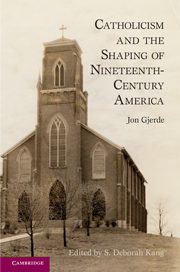Book contents
6 - The American Economy and Social Justice
Published online by Cambridge University Press: 05 June 2012
Summary
That Catholicity gives full scope and freedom to individual action, is seen on a broader scale in the characteristics of Catholic nations. For though she makes all men Catholic, yet at the same time they lose nothing of their individual or national virtues. Italy, Spain, Germany, France, Ireland, Belgium, are all Catholic nations, yet how widely different in their personal and national character! . . . The Catholic Religion is the only religion which preserves the individuality of persons as well as the characters of nations. Alas! there was a time when England had a national character, and that was when she was under the healthful influences of Catholicity; – England then was merry, renowned for her piety and religious institutions. What is England renowned for now? Sadness, impiety, ginshops, workhouses, and factories.
Isaac Thomas Hecker, 1857In 1843, Madame Calderon de la Barca painted a discerning picture of life when she compared village life in New England and in Mexico. The wife of the Spanish ambassador to Mexico, she had fond memories of home when she took her readers on a tour of an archetypal “small and flourishing” New England town. There, the four new churches – each representing a different sect – symbolized a “religion suited to all customers.” Elsewhere, neat stores and dwelling houses – all new, wooden, clean, and ornamented with slight Grecian pillars – proclaimed “prosperity, equality, consistency” and an eye toward the future. Implicitly, she suggested that a happy marketplace existed both in commerce and religion. In contrast, the Mexican village was dominated by two images. One included the “Indian huts, with their half-naked inmates,” and the other included the church, “grey and ancient, but strong as if designed for eternity,” with saints and virgins and gold, silver, and precious stones, “whose value would buy up all the spare lots in the New England village.” Everything there was reminiscent of a distant past, whereas all in the present was “decaying and growing fainter” as humans seemed to trust “to some unknown future which they may never see.” The garish, backward-looking church complemented an economy of lethargy, and a society divided between haves and have-nots.
- Type
- Chapter
- Information
- Catholicism and the Shaping of Nineteenth-Century America , pp. 220 - 256Publisher: Cambridge University PressPrint publication year: 2011



